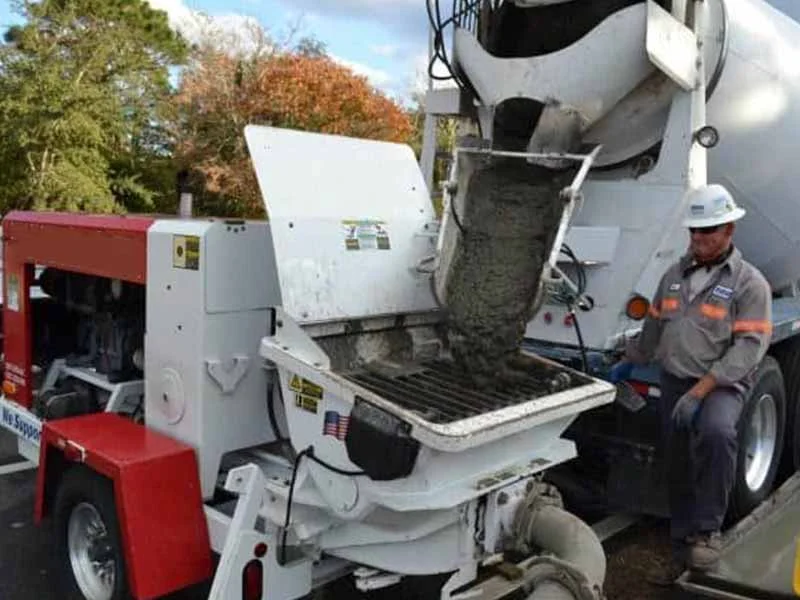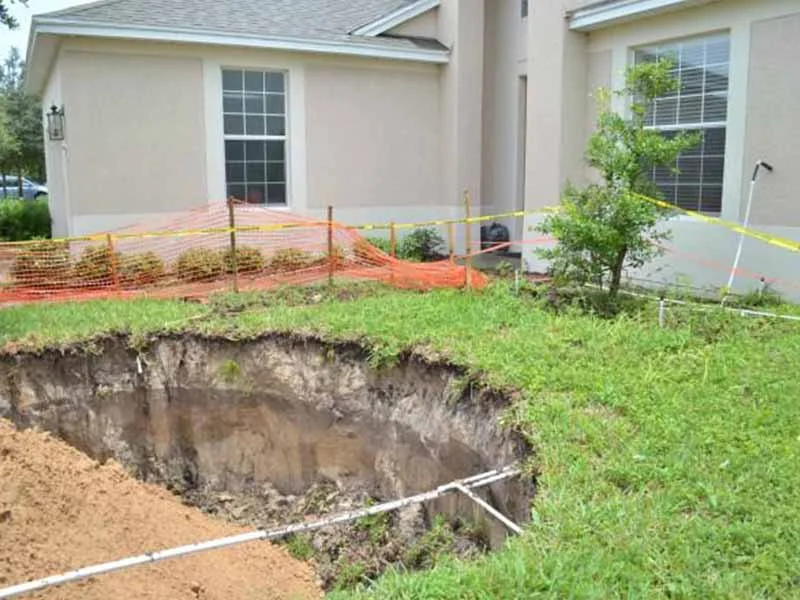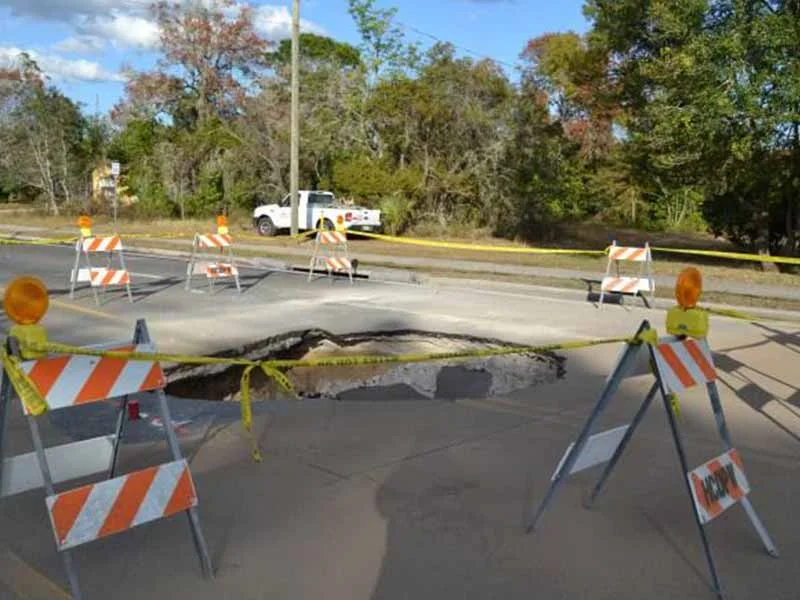Sinkhole Remediation in Cocoa, FL
Cocoa Foundation Repair offers comprehensive sinkhole remediation services in Cocoa, FL, utilizing advanced techniques and technologies to stabilize and restore properties affected by sinkholes. With over 35 years of experience serving the community, trust us to provide effective solutions that ensure the safety and stability of your property.
- Financing Option
- Lifetime Warranty
- Free Estimates
- Upfront Pricing
See Why Our Customers From Cocoa Loves Us!

About Cocoa Foundation Repair
Cocoa Foundation Repair stands as a beacon of excellence in Cocoa, FL, with over three decades of unwavering dedication to providing reliable and effective foundation repair solutions. Our stellar reputation is built upon a foundation of integrity, superior craftsmanship, and a relentless commitment to customer satisfaction.
Whether it’s residential or commercial projects, our team of experts possesses the experience and resources to handle any foundation repair job with precision and efficiency. We understand the importance of a strong foundation and strive to deliver long-lasting results that exceed expectations.
When you choose Cocoa Foundation Repair, you’re choosing peace of mind and unparalleled expertise in safeguarding your property’s structural integrity.
Services We Offer:
What is Sinkhole Remediation?
Sinkhole remediation is a multifaceted process aimed at addressing the structural and safety concerns associated with sinkhole activity. Sinkholes are geological phenomena characterized by the sudden collapse of surface materials into underground voids, often caused by the dissolution of soluble rock formations such as limestone or gypsum. Sinkhole remediation involves a combination of techniques and strategies to stabilize the affected area, mitigate risks, and prevent further damage.

Reasons You Need Sinkhole Remediation
Sinkholes pose significant risks to both property and personal safety. Here are some compelling reasons why sinkhole remediation is essential:
Structural Stability
Sinkholes can compromise the structural integrity of buildings and infrastructure, leading to potential collapse or damage. Without proper remediation, the stability of foundations, roads, and other structures may be compromised, posing risks to occupants and nearby properties.
Safety Concerns
Sinkholes create hazards for pedestrians, vehicles, and structures. Without remediation, they can pose serious safety risks to occupants and passersby. Sudden collapses or sinkhole formations can result in injuries, fatalities, and property damage, highlighting the critical importance of addressing sinkhole issues promptly.
Property Value
Inadequate drainage around the foundation can contribute to water accumulation, leading to soil saturation and increased pressure on the foundation supports. This can occur due to improper grading, clogged gutters, or inadequate surface drainage systems. Over time, the excessive pressure exerted on the foundation can cause settling, shifting, or cracking, exacerbating existing issues and necessitating repairs.
Liability Issues
Property owners may be held liable for injuries or damages resulting from sinkhole-related incidents if remediation measures are not taken promptly. Failure to address sinkhole issues in a timely manner can result in legal liabilities, lawsuits, and financial repercussions for property owners, underscoring the importance of proactive remediation efforts.
Environmental Impact
Sinkholes can disrupt ecosystems and waterways, leading to environmental degradation and habitat loss. The collapse of sinkholes can alter surface water flow patterns, affect groundwater recharge, and damage vegetation, impacting local ecosystems and biodiversity. Remediation efforts aim to mitigate these environmental impacts and restore the natural balance of affected areas.

Ways to Prevent Sinkhole Formation
While sinkholes can occur naturally, certain preventive measures can help minimize the risk of sinkhole formation:
- Groundwater Management: Proper management of groundwater levels is crucial for preventing excessive erosion and the dissolution of soluble rock formations that contribute to sinkhole formation. Monitoring and controlling groundwater extraction activities can help maintain stable underground conditions and reduce the risk of sinkholes.
- Surface Water Drainage: Implementing effective surface water drainage systems is essential for redirecting water away from vulnerable areas, such as sinkhole-prone regions. Properly designed drainage systems can help prevent soil erosion, minimize the saturation of underground formations, and reduce the likelihood of sinkhole formation.
- Soil Stabilization: Treating soils with additives or stabilizing agents can enhance their strength and stability, reducing the risk of subsidence and sinkhole formation. Techniques such as compaction grouting, soil cementing, or chemical stabilization can improve the load-bearing capacity of soils and mitigate the effects of erosion and groundwater movement.
- Vegetation Management: Planting and maintaining vegetation play a vital role in stabilizing soils and preventing erosion, which can contribute to sinkhole formation. The roots of trees, shrubs, and grasses help bind soil particles together, enhance soil structure, and absorb excess moisture, reducing the risk of sinkholes. Additionally, vegetative cover can intercept rainfall, minimize surface runoff, and protect underlying soils from erosion.
- Regular Inspections: Conducting routine inspections of properties and infrastructure is essential for early detection of sinkhole-related issues. Property owners should regularly assess the condition of land surfaces, structures, and drainage systems for signs of sinkhole activity, such as depressions, cracks, or settlement. Prompt identification of potential sinkhole hazards allows for timely remediation measures to be implemented, minimizing the risk of property damage and ensuring the safety of occupants.
- Geotechnical Investigations: Conducting geotechnical investigations and assessments can provide valuable insights into the geological and hydrological conditions of a site, identifying potential sinkhole hazards and vulnerabilities. Professional geotechnical engineers can evaluate soil properties, groundwater levels, and geological formations to assess the risk of sinkhole formation and recommend appropriate preventive measures.
By proactively implementing these preventive strategies and collaborating with experienced professionals, property owners can effectively reduce the risk of sinkhole formation and safeguard their assets from potential damage and disruption.
Services Included in Sinkhole Remediation
Sinkhole remediation encompasses a comprehensive range of services aimed at stabilizing and repairing properties affected by sinkholes. These services are tailored to the unique needs of each property and are designed to restore stability and safety effectively. Our services include:
- Sinkhole Assessment: Thorough inspection and assessment of the property to determine the extent of sinkhole-related damage and formulate an appropriate remediation plan. Our experienced team utilizes advanced techniques and technologies to identify sinkhole activity and assess its impact on the property’s structural integrity.
- Grout Injection: Injecting specialized grout or materials into the ground to fill voids and stabilize the soil, preventing further subsidence. Our grout injection process effectively reinforces the ground beneath the affected area, providing structural support and preventing future sinkhole development.
- Compaction Grouting: Injecting fast-setting grout into the ground to densify and stabilize loose or weak soils, providing additional support to the affected area. Compaction grouting is particularly effective for addressing sinkhole-related issues such as soil settlement and ground subsidence, restoring the integrity of the soil and preventing further damage.
- Underpinning: Strengthening and stabilizing the foundation of structures by installing additional supports or piers beneath the ground surface, ensuring structural integrity. Our underpinning techniques effectively redistribute the weight of the structure and provide enhanced support, mitigating the risk of sinkhole-related structural damage.
- Soil Stabilization: Treating the soil with additives or stabilizing agents to improve its strength and stability, reducing the risk of sinkhole formation or collapse. Our soil stabilization methods enhance the load-bearing capacity of the soil and minimize the potential for future sinkhole activity, ensuring long-term stability and safety for your property.
- Monitoring and Maintenance: Implementing a comprehensive monitoring and maintenance program to assess the effectiveness of sinkhole remediation measures and ensure ongoing stability and safety. Our team provides regular inspections and maintenance services to detect any signs of sinkhole activity and address them promptly, minimizing the risk of future damage.
These services are conducted by our skilled and experienced team of professionals, who are committed to delivering exceptional results and ensuring the long-term stability and safety of your property. Contact us today to learn more about our sinkhole remediation services and schedule a consultation.
Alternatives for Sinkhole Remediation
In addition to traditional sinkhole remediation methods, various alternative approaches can be employed, depending on the severity and nature of the sinkhole:
- Geotechnical Monitoring: Continuous monitoring of ground conditions using sensors and instrumentation allows for the detection of changes in soil stability and the effectiveness of remediation measures. By closely monitoring ground movements and subsurface conditions, geotechnical monitoring provides valuable data for assessing risk and implementing targeted remediation strategies.
- Sinkhole Filling: For smaller sinkholes or areas of localized subsidence, sinkhole filling may be a viable option. This involves filling the void with specialized materials or grout to stabilize the ground and prevent further subsidence. Sinkhole filling can help restore the integrity of the affected area and reduce the risk of structural damage or collapse.
- Localized Drainage Improvements: Addressing water infiltration and drainage issues is crucial for preventing sinkhole formation and mitigating risks. Implementing targeted drainage solutions, such as installing French drains, swales, or culverts, can help redirect water away from sinkhole-prone areas and reduce the risk of soil erosion. By managing surface water runoff effectively, localized drainage improvements help maintain soil stability and minimize the likelihood of sinkhole development.
- Land Use Planning: Proactive land use planning plays a vital role in mitigating sinkhole risks and protecting vulnerable properties from potential hazards. By implementing land use policies and regulations, such as setback requirements, building codes, and zoning restrictions, communities can minimize development in sinkhole-prone areas and ensure responsible development practices. Land use planning helps reduce exposure to sinkhole-related risks and promotes the long-term safety and resilience of communities.
These alternative approaches may be used alone or in combination with traditional remediation methods to effectively address sinkhole-related issues and mitigate risks. By considering the unique characteristics of each sinkhole and site-specific conditions, property owners and stakeholders can develop comprehensive sinkhole remediation strategies tailored to their needs and objectives.
Searching for Sinkhole Remediation Near Me? Call Us Today!
If you suspect sinkhole activity on your property in Cocoa, FL, don’t wait until it escalates into a larger problem. Contact Cocoa Foundation Repair for professional sinkhole remediation services tailored to your needs. Our experienced team will assess the situation, develop a customized remediation plan, and provide efficient and effective solutions to restore the stability and safety of your property.
Frequently Asked Questions (FAQs)
Frequently Asked Questions About Cocoa Sinkhole Remediation
Early signs of sinkhole formation may include gradual depressions or indentations in the ground, particularly in areas with underlying limestone, gypsum, or salt formations. Other indicators may include the development of cracks in walls or floors, tilting or slumping of structures, or changes in the landscape such as the appearance of new ponds or standing water. If you notice any of these signs, it’s crucial to have your property evaluated by a qualified professional to assess the risk of sinkhole activity.
Several factors can influence the duration of sinkhole remediation, including the size and depth of the sinkhole, the extent of structural damage, the chosen remediation technique, and site-specific conditions such as soil composition and groundwater levels. Our experienced team will conduct a thorough assessment of your property and provide you with a detailed timeline for the remediation process during the consultation phase.
The sinkhole remediation process typically involves several steps, including site assessment and investigation, development of a remediation plan, implementation of remediation measures such as grout injection or soil stabilization, and post-repair monitoring and maintenance. Our team will guide you through each stage of the process, ensuring that your property is effectively remediated and restored to a safe and stable condition.
While sinkhole formation can be influenced by geological factors beyond your control, there are several preventive measures you can take to minimize the risk of sinkhole activity on your property. These may include maintaining proper drainage to prevent water accumulation, avoiding over extraction of groundwater, conducting regular inspections of your property for signs of sinkhole activity, and consulting with a qualified geotechnical engineer or sinkhole remediation specialist for expert guidance on risk mitigation strategies tailored to your specific property and location.


